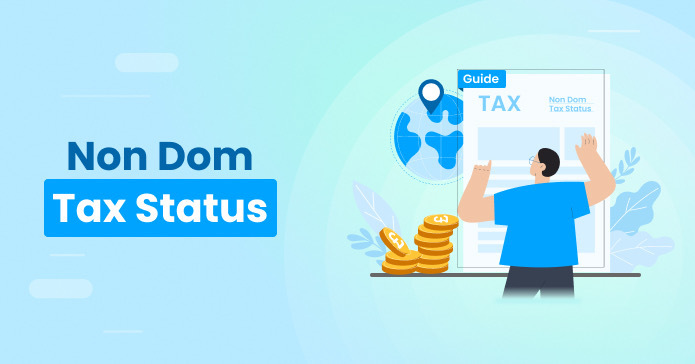Navigating the intricacies of the UK tax system can be daunting, especially if you are an expat or a multinational with varied income streams. One area that has garnered significant attention is the Non Dom (Non-Domiciled) Tax Status. This article aims to unfold international tax status and provides easy-to-understand insights into how it affects you if you are a non-domicile.
What is Non Dom Tax Status in the UK?
Non-Domiciled (Non Dom) Tax Status in the UK allows individuals who are residents but not domiciled in the UK to choose how they are taxed on their foreign income and gains. Essentially, this status can provide significant tax advantages, particularly for those with substantial overseas income or assets.
Who is Considered to be Non Dom?
You are considered non-domiciled in the UK if your permanent home (domicile) is outside the UK. Even if you reside in the UK, you can claim Non Dom status if you have a foreign domicile (usually the country where you were born or intend to return to).
According to Guidance note for residence, domicile and the remittance basis: RDR1, you are likely to be considered domicile if;
- were born in the UK
- have lived here for most of your life
- are now living here permanently
Who Needs to Pay Non Dom Tax in the UK?
If you are a Non Dom resident in the UK, you have two options for how your foreign income and gains are taxed:
- Arising Basis: You pay UK tax on all your income and gains, regardless of where they arise.
- Remittance Basis: You only pay UK tax on the income and gains you bring (or "remit") into the UK.
Choosing the remittance basis usually involves a remittance basis charge if you've been a UK resident for a certain number of years.
Exceptions to Non Dom Tax Status UK
YOU DON`T PAY TAX In the UK your foreign income or profits if you meet two strict conditions:
- The total amount is under £2,000 for the tax year.
- These earnings are not brought into the UK, such as through a transfer to a UK bank account.
In case both these conditions are met, you're automatically exempted from any action.
If You Both Work in the UK and Abroad
Particular tax guidelines apply should you be an individual who is employed both in the UK and overseas.
You're not obligated to pay tax on income or profits achieved abroad (including those you transfer into the UK) if you fit in foreign worker status.
You're eligible for this if:
- the earnings from your job outside the UK are under £10,000
- any other overseas income (like interest from bank accounts) is below £100
- all your income achieved overseas is subject to tax in the foreign country (even if no payment was required, for instance, due to a tax-free allowance)
- your total income from the UK and abroad falls within the basic rate Income Tax band
- there's no other reason compelling you to submit a tax return
Reporting Foreign Income?
It's crucial to report your foreign income accurately to HMRC. Failure to do so can result in hefty penalties. Here's what you need to know:
If your sole foreign income is dividends and they are less than £200, check the latest dividend allowances here. You need to make sure that you have strictly no other income to report to HMRC.
- Types of Foreign Income: This includes rental income, dividends, interest, pensions, and any other income earned abroad.
- Documentation: Maintain detailed records of all foreign income and any taxes paid overseas. Double taxation treaties may also impact your UK tax liability.
What Are the Residency Criteria?
Your residency status significantly impacts your tax obligations. HMRC uses the Statutory Residence Test (SRT) to determine residency, which considers factors like the number of days spent in the UK and ties to the country (family, work, accommodation).
Non Dom Status and Capital Gains Tax (CGT)
Non Dom individuals are subject to CGT on UK assets, but foreign gains are only taxable if remitted to the UK. For example, if you sell a property overseas, the gain is only taxable when you bring the proceeds into the UK.
Non Dom Status Tax Threshold
For the 2023/24 tax year, the tax-free allowance for CGT is £12,570. Capital Gains has a yearly exemption of £6000. Any gains above this amount will be taxable. For Non Dom individuals, this threshold remains the same unless remitting foreign income, where different rules may apply.
What Are the Rules if You Work in the UK and Abroad?
If you split your work between the UK and another country, different tax rules may apply depending on your residency status and the specifics of any double taxation treaties. Generally, income earned from work performed in the UK is taxable, while foreign earnings are subject to remittance basis rules.
Non Dom Status and UK Inheritance Tax
Inheritance tax (IHT) can be a complex area for Non Dom individuals. Generally, Non Dom status allows you to exclude overseas assets from your UK estate for IHT purposes. However, if you've been a long-term resident (15 out of the last 20 years), you may be deemed domiciled in the UK for IHT.
The rules of inheritance tax apply to all residence, including foreigners. If at the time of death, the tax value of your UK assets is more than £325,000.00 (tax exemption threshold), then you may be liable to pay inheritance tax on an amount greater than this. If a property exceeds this threshold, it is taxed to 40% of the value.
How to Report Your Foreign Income
Reporting your foreign income involves several steps:
- Self-Assessment: File a Self-Assessment tax return annually, detailing all your income and gains.
- Foreign Income Supplement: Complete the Foreign Income Supplement section if applicable.
- Remittance Basis Claim: If opting for the remittance basis, ensure your claim is included in your tax return.
Rent and Pension if You Are Non Dom
Pension: The rule is to pay tax on pensions if you are and were resident in the last 5 tax years in the UK. So if you were a resident here at some point until 2019, you are obliged to pay tax even though you are abroad.
Rent: If you rent multiple premises you can offset the losses.
Non Dom Tax Relief
Fill out the form here and send it to HMRC. You can also do it online or call 0300 200 3300.
Several reliefs and allowances can reduce your tax liability:
- Personal Allowance: Non Dom individuals may still qualify for the UK Personal Allowance.
- Double Taxation Relief: Avoid being taxed twice on the same income.
- Specific Reliefs: Depending on your circumstances, other reliefs such as Business Investment Relief may be available.
Conclusion
Understanding Non Dom Tax Status in the UK is crucial for expats, taxpayers, importers, exporters, and multinationals. The key to optimizing your tax position lies in understanding the rules and making informed choices about how your income and gains are taxed.
To stay compliant and make the most of your Non Dom status, it is advisable to consult with tax experts who can provide tailored advice based on your unique situation. Whether you are navigating capital gains, inheritance, or income tax, professional guidance can help you maximize your financial health while minimizing your tax liability.













